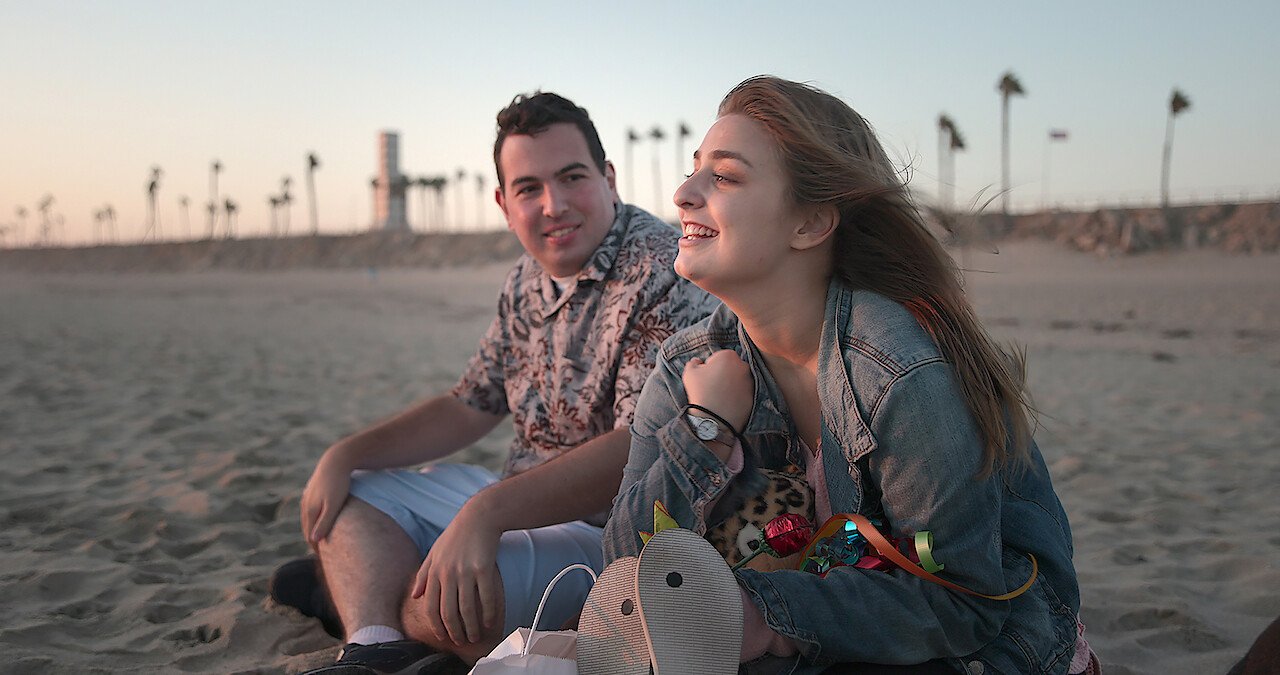Netflix’s Disability Dating Shows Need to Be Rethought
Via Netflix
When asked by her uncle and aunt what she wants from an “adult relationship,” autistic actor Dani Bowman answers, “You mean checking out the size of his banana?” Dani’s uncle and aunt — also her guardians — let out an embarrassed laugh in response. Dani repeats, “You know what I mean? His banana!” More awkward laughter follows. After a pause, the aunt says, “A lot of people think that girls on the spectrum don’t think about sex, but you do!”
The scene is a snippet from Netflix’s viral reality dating show, “Love on the Spectrum,” the newest season of which was released — and topped trending lists — on the streaming giant recently. The documentary-style show, which captures autistic participants navigating the dating world, won three Emmys in 2022 including for Outstanding Unstructured Reality Program, and has quickly become a darling of neurotypical audiences. “Heartwarming,” and “enlightening” are some common descriptors used by reviewers. The latest from “Love on the Spectrum” comes hot on the heels of Netflix’s 2023 “Down for Love,” a reality show made in a very similar format — though produced by a different team — that explores the love-finding journeys of people with Down Syndrome. Disability-focused dating shows are on the rise, but who are they made for?
“The audience is not disabled people. It’s predominantly non-disabled people or their families and caretakers,” said assistant professor of English Language and Literature at the University of British Columbia, J. Logan Smilges, who specializes in disability and rhetoric (Smilges’ 2023 book “Crip Negativity” lays out the landscape of modern disability politics in America). “These shows are not about visibility. They’re about spectacularization; about producing a kind of intimacy through distancing.”
Participants are infantilized (cue the awkwardness around Dani’s sexuality), stereotypes of disability are furthered, and a deep, disturbing ignorance of the disability community’s dating and sexual preferences is presupposed. All of the above are then packaged in an uncomfortably voyeuristic lens.
“The way that the narrator describes disabled people makes me feel like I’m watching a nature documentary,” said Florida-based autistic attorney Haley Moss. The 29-year-old refers to the reductive introduction of the participants that flattens their personalities to their love for lions and bubble gum. “There is no civic capacity offered to these disabled people. They don’t contribute, only take. They require care and sacrifice. That is, of course, a trope and an editing choice,” Smilges said of the uni-dimensional portrayal that largely excludes participants’ professional and social lives. Another autistic reviewer called the quirky, childlike background tunes “more appropriate for a documentary about clumsy baby giraffes than for a reality series about adult humans.”
Infantilization also manifests in both shows through friends, wellwishers, parents, caregivers, and dating coaches constantly dishing out unsolicited advice to participants about basic human interaction: how to conduct a successful conversation or how to greet a date for the first time. Smilges likened this type of taming to applied behavioral analysis, a controversial treatment frequently prescribed for autism and Down Syndrome. “Its sole objective is to teach autistic children how to sublimate their autism and appear neurotypical in a way that alleviates the discomfort of non-disabled people,” Smilges said.
Cultural implications aside, the very premise of the shows rests on faulty assumptions. Both “Love on the Spectrum” and “Down for Love,” tend to emphasize their hollow central messaging, time and again, as if to prove a point: people with disabilities can date and find love too. In doing so, they inadvertently otherize the community with a “look-at-them” obnoxiousness. The creators presume the worst of audiences and then attempt to enlighten the uninformed netizens of Netflix. The sketchy raison-d’etre is apparent, too, in the creative impetus of Cian O’Clery, director of all four seasons (U.S. and Australia) of “Love on the Spectrum.” “We didn’t know it was going to be this big when we made the series for Australia,” O’Clery said in a recent interview with Netflix. “It was based on people we’d worked with and kind of thought it was a nice little story to tell.”
Given their way, Smilges would rather that shows like “Love on the Spectrum” and “Down for Love” didn’t exist. In their opinion, no representation is better than flawed representation. It’s the people at the margins of a marginalized community that flawed visibility harms. “These kinds of shows operate as fear-mongers for the parents of disabled children,” they said. “The likelihood of those children being forced into harmful clinical practices such as applied behavior analysis becomes higher because parents see this and say, “I don’t want my kid to end up like that. I want to fix my child.””
Moss, for her part, thinks that disability dating shows should have disabled co-creators at the helm. She also endorses coded representations of disability like Beth Harmon (Anya Taylor-Joy) in “The Queen’s Gambit.” Viewers can relate to these characters on their terms, she said, “rather than looking to see if this person is a collection of traits.”
This story originally appeared on IndieWire
